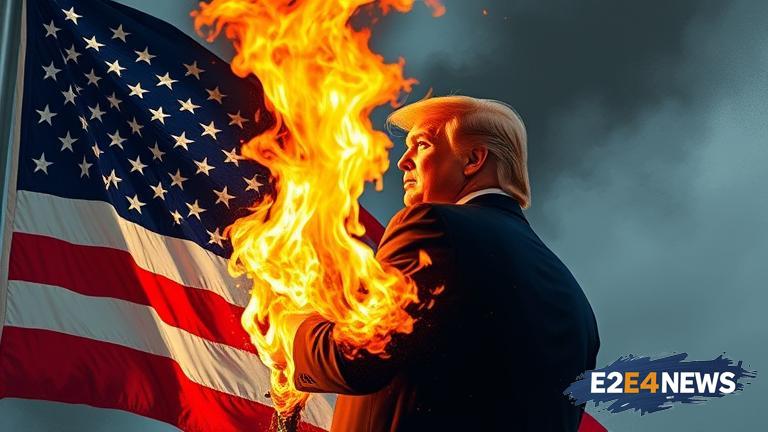The United States has witnessed a significant development in the realm of free speech and patriotism, as President Donald Trump has introduced an executive order that aims to penalize individuals who burn the American flag. This move has been met with widespread criticism and debate, with many arguing that it challenges the fundamental principles of free expression and the First Amendment. The executive order, which proposes a one-year jail term for those found guilty of desecrating the flag, has been seen as a direct challenge to the 1989 Supreme Court ruling in the case of Texas v. Johnson. In this landmark case, the court had ruled that flag burning was a form of protected speech under the First Amendment, sparking a national debate on the issue. The new order has been viewed as an attempt to undermine this ruling and restrict the freedom of expression. Many have argued that the order is unconstitutional and violates the principles of free speech, which are fundamental to American democracy. The move has been criticized by civil liberties groups, who argue that it is an attempt to stifle dissent and restrict the rights of citizens to express themselves. The American Civil Liberties Union (ACLU) has been vocal in its opposition to the order, stating that it is a clear violation of the First Amendment. The organization has argued that the order is an attempt to intimidate and silence those who wish to express their dissent through peaceful means. The debate surrounding the flag burning order has also sparked a wider discussion on the role of patriotism and national symbols in American society. Many have argued that the flag is a symbol of American values and principles, and that desecrating it is a form of disrespect to the nation and its people. However, others have countered that the flag is also a symbol of freedom and democracy, and that restricting the right to burn it is a form of hypocrisy. The issue has also been viewed through the lens of political polarization, with many Democrats and liberals opposing the order and many Republicans and conservatives supporting it. The move has been seen as a classic example of the culture wars that have been raging in the United States in recent years. Despite the controversy surrounding the order, it is unclear whether it will be implemented or upheld by the courts. The order has been challenged by several lawsuits, which argue that it is unconstitutional and violates the principles of free speech. The Supreme Court may ultimately be called upon to rule on the issue, which could have significant implications for the future of free expression in the United States. In the meantime, the debate surrounding the flag burning order continues to rage, with many Americans weighing in on the issue and expressing their opinions on social media and other platforms. The issue has also sparked a wider discussion on the role of the executive branch in shaping American policy and the limits of presidential power. Many have argued that the order is an example of executive overreach, and that it highlights the need for greater checks and balances on the power of the presidency. As the debate continues to unfold, it is clear that the flag burning order has significant implications for American democracy and the principles of free speech. The order has sparked a national conversation on the importance of patriotism, national symbols, and the role of the government in regulating expression. Ultimately, the outcome of this debate will have significant implications for the future of American society and the principles of democracy that underpin it. The flag burning order has also raised questions about the impact of social media on political discourse and the spread of information. Many have argued that social media platforms have played a significant role in amplifying the debate and allowing citizens to express their opinions on the issue. However, others have countered that social media has also contributed to the polarization of the debate, with many individuals using platforms to spread misinformation and inflammatory rhetoric. As the debate continues to evolve, it is clear that the flag burning order has significant implications for American democracy and the principles of free speech. The order has sparked a national conversation on the importance of patriotism, national symbols, and the role of the government in regulating expression. The issue has also highlighted the need for greater nuance and understanding in public discourse, as well as the importance of protecting the principles of free speech and democracy.
